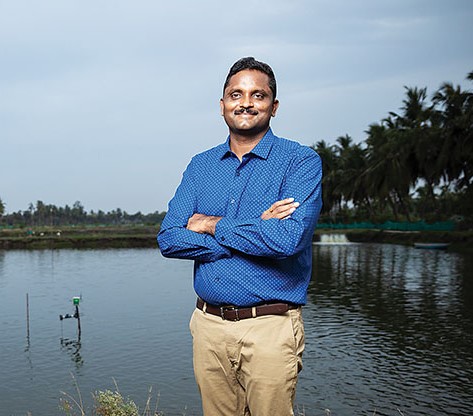Entrepreneurs
Sreeram Raavi: Empowering Aquaculture Through Innovation and Technology

In the heartland of Andhra Pradesh, where the vibrant hues of chilli and cotton farms paint the landscape, Sreeram Raavi‘s journey unfolded from semiconductor design to pioneering solutions for the aquaculture industry. Born and raised in Pedanandipadu village, Raavi, an electrical engineer by training, found his true calling at the intersection of technology and agriculture.
Raavi’s foray into agri-tech was sparked by a family incident in 2011 when a sudden change in water quality led to the loss of an entire fish population in his uncle’s pond. This event triggered a deep reflection on how technology could be harnessed to monitor and safeguard crucial parameters in aquaculture, particularly the dissolved oxygen levels that are vital for the well-being of fish and shrimp.
Recognizing the lack of scientific tools for aquaculture farmers, Raavi founded Eruvaka Technologies in April 2012, with the aim of providing innovative solutions to the challenges faced by the aquaculture industry. Eruvaka’s flagship product, PondGuard, addresses a critical concern in aquaculture – monitoring the levels of dissolved oxygen in ponds. Oxygen depletion can occur due to various factors, including weather conditions, excess feeding, or power outages affecting aerators. PondGuard utilizes sensors to measure oxygen levels in real-time, transmitting data to Eruvaka’s cloud servers and, subsequently, to the farmer’s smartphone via the PondLogs app.
The real-time monitoring capability and alerts empower farmers to take prompt action when oxygen levels fall below a certain threshold, mitigating the risk of fish and shrimp mortality. This technology eliminates the guesswork traditionally associated with aquaculture, providing farmers with peace of mind. Eruvaka’s commitment to transforming aquaculture extends beyond PondGuard. The company’s product portfolio includes PondMother, an automated feeder for shrimp, and ShrimpTalk, an Internet of Things (IoT) device that listens to the sounds made by shrimp while eating. ShrimpTalk’s sophisticated technology analyzes these sounds to determine if the feed has been consumed fully, minimizing wastage and contributing to a healthier pond environment.
While PondMother hit the market in 2015, the development of ShrimpTalk took four years, with the product becoming commercially available in 2018. Raavi’s dedication to innovation and understanding the intricacies of shrimp farming has positioned Eruvaka as a leader in the aquaculture technology space. Eruvaka’s success is not confined to Indian shores. The company’s products have garnered attention and acclaim globally, with 90 percent of its sales coming from international markets, particularly Latin America and Southeast Asia. Raavi’s vision aligns with the Make-In-India initiative, with Eruvaka proudly contributing to employment in coastal Andhra Pradesh while exporting its products to diverse regions.
In April 2018, Raavi secured a $5 million series B funding round from investors such as Nutreco, a Dutch animal and aqua-feed company, and Omnivore. This financial backing, coupled with Eruvaka’s in-house expertise across mechanical, electronics, and computer science domains, has propelled the company’s growth.
Eruvaka achieved profitability from FY19, with a remarkable year-on-year revenue growth exceeding 100 percent. Raavi’s entrepreneurial journey extends beyond financial success; it encapsulates a commitment to revolutionizing aquaculture practices, fostering mutual trust between farmers and technologists, and building a knowledge base that enhances the industry’s sustainability.
Looking ahead, Raavi envisions the development of devices for pisciculture, broadening Eruvaka’s impact across different facets of aquaculture. Leveraging the data generated by devices like ShrimpTalk, the company aims to launch an advisory service for farmers. This service will provide valuable insights, enabling farmers to make informed decisions and optimize their operations. Furthermore, Raavi plans to introduce an online marketplace connecting shrimp farmers to buyers, creating a comprehensive ecosystem that combines technology, knowledge-sharing, and market access.
Entrepreneurs
Rising with Ras Al Khaimah Cement: 26 Years of Innovation and Sustainability

Ras Al Khaimah Cement Company has grown into a leading player in the construction sector of the UAE. Over the 26 years since its inception, Ras Al Khaimah Cement Company has managed to remain as a respected cement producer that has significantly contributed towards the development of the UAE and the broader region within the Middle East.
The main reason for the success of RAKCC is its strategic location in Ras Al Khaimah, which makes it easy to gain access to high-quality raw materials, and the fact that the Emirates of Ras Al Khaimah have a lot of limestone-which is one of the products most needed in cement production. Acquisition of raw materials within the region leads to a minimal risk of causing harm from environmental damage due to transport and the guarantee of better quality products. RAKCC can enjoy proximity to Saqr Port. The company could quickly and easily load vessels up to 40,000 dwt, on which exportation of cement to international markets is eased. The task of handling voluminous shipments within a minimum time frame has simply propelled the company to become one of the leading suppliers in the GCC region and elsewhere.
RAKCC was a plant based on the best technology back then to ensure cement to be of the international finest class. The pursuit of state-of-the-art technology leads its activities to date. Of raw material processing, from start to finish, each step to the final stages of production is carefully controlled for consistency and quality of the final product produced. Such dedication to excellence has helped Ras Al Khaimah Cement Company establish long-term relationships with its customers, who are mostly reliant on the company for quality, dependable cement for use in any construction projects. From infrastructure and residential to commercial developments, RAKCC cement products have become synonymous with strength and durability.
The greatest achievement of Ras Al Khaimah Cement Company is customer satisfaction, where the company creates a mutually beneficial partnership with clients through quality products delivered at the right time. The approach of its customer-centric focus towards its customers has made RAKCC a dependable company, which is now on top of the list for many contractors and construction companies in the UAE as well as the whole GCC region.
Management and employees share the same close contact with their clients to understand their needs and give them solutions tailored to their requirements. The whole idea behind this form of cooperation is it creates trust and leads to long-term relationships, which in turn continues to add growth in a company’s success and longevity. Ras Al Khaimah Cement Company also commits to environmental mitigation. The company invested on various initiatives that will make it go green and will ensure that the operations of the plant are environmentally sustainable. These include the modern technologies in the reduction of emissions and wastes, and conservations of water and energy on the production process.
RAKCC also takes its responsibility to the surrounding communities very seriously. The company works to protect the environment in Ras Al Khaimah by strictly adhering to environmental regulations and continuously improving its process to reduce its carbon footprint. With such initiatives, RAKCC aims at being a model to other companies in the region that one can balance industrial growth with concern for the environment.
Ras Al Khaimah Cement Company has been playing a pivotal role in the development of the UAE for the past 26 years through superior cement quality that has assisted in shaping the modern landscape of the nation. RAKCC focuses on achieving technological innovations, customer satisfaction, and environmental sustainability. Ras Al Khaimah Cement Company is more than just a cement producer-it’s an integral partner that will guarantee steady growth in the economy of the UAE. RAKCC is poised as it goes forward into the future, building on a legacy of quality and excellence prepared to face the challenges of tomorrow.
Entrepreneurs
Strengthening Insurance Through Partnership: Arig’s Impact on Afro-Asia’s Markets

Arig, as a specialist reinsurer in the Afro-Asia region, has over 36 years of honing that craft. As a trusted partner with an intimate understanding of the dynamic regional economy, Arig brings much more than security. It brings much-needed knowledge, commitment, and local know-how into the support of your growth. Arig delivers a unique level of understanding of risks in the Afro-Asia region, varying in countries with emerging economies, different regulatory regimes, and specific forms of risks. This reinsurer is relatively conversant with the risks involved with these countries and hence truly satisfies the needs of those operating in such markets. With this proactive nature, Arig can serve up custom reinsurance solutions that fit the dynamic nature of the respective economies.
Launched in 1980 and based in the kingdom of Bahrain, Arig has transformed itself not only as a regional leader but also as a truly global brand name in the field of reinsurance. Listed on both the Bahrain and Dubai stock exchanges, Arig boasts more than 6,000 institutional and private investors, signifying full backing and sound financial security to qualify as a reliable reinsurer. Among the foundations of sound security, customer-centric service, and in-depth market expertise, it has built up the reputation of the company. What stands out for Arig apart from its contemporaries is the particularity concerning how it addresses a client’s specific needs. The company provides reinsurance products with wide choices that ensure flexibility and adaptability on its side to let insurers be well-equipped to respond effectively to market demands. Whether it is property, liability, motor, or marine, Arig’s solutions are built with the insurers in mind – to help them grow and win within the ever-changing landscape.
Arig’s people are product specialists and experts in technical fields as well as deep indigenous knowledge of the regional markets of Africa and Asia, making the company uniquely positioned to add real value to clients with predictive market change signals. From regulatory movements to economic developments, the team of Arig collaborates closely with clients to help them prepare well for the future. At the core of Arig’s operations is a very strong commitment to long-term partnership. Transactions are clearly not an option, but mutual trust and shared growth into the future. Clients of Arig will benefit from the fast response time and a customer-centric approach so that customers will receive support toward the fulfilment of business objectives.
In addition, Arig has a vision for the future that also includes operating with respect for the environment. With regard to sustainable business practices growing in prominence on the global scene, the reinsurance industry is no exception in this regard. The work done by Arig is aimed at ensuring that the company’s operations are modern and up-to-date with the expectations that exist when it comes to environmental stewardship, yet always maintaining the high level of service it provides.
Arig understands that no partnership is possible without good communication. A reinsurer with deep roots in the Afro-Asia region, Arig communicates in its markets, not just literally, but certainly figuratively by being conversant with the nuances surrounding culture, economics, and regulation, all of which are shaped into nuances around insurance. This kind of expertise permits Arig to offer invaluable support to insurers: support over whether it is possible to respond to local market demands confidently.
Entrepreneurs
Jumana Khan: Fashion, Fun, and Influence Across Social Media

Jumana Khan is famous for her success as an oriental model, Dubai-based fashion blogger, and social media influencer. She is a raging tornado in the digital world, being a household name, mainly because of her fashion tips and trend-setting styles inspiring millions of followers in her 5.8 million followers on Instagram. She has bagged 9.2 million followers on TikTok where her creativity knows no bounds. There she showcases lip-syncing, dancing, and comedic sketches garnering a whopping 213.6 million likes. But her road to stardom on social media is not only a testament to entertainment; it is a path of hard work, fashion forward-thinking, and the authentic connection she has made with her fans.
Jumana Khan was an ardent fan of fashion; she went to Instagram, then sort of leaned into everything there while fostering an online presence that is now taking on a life of its own. From street-style styling to glamorous evening wear, Jumana’s effortless sense of style quickly captured the attention of fashion enthusiasts across the UAE and beyond. She can easily mix high-end pieces with affordable fashion and is making it possible for her style to reach a wide audience, giving her an enticing appeal in the world of influencers. Joining TikTok made her diversify her content on Instagram. She started making entertaining lip-sync videos and uploading dance routines and comedy clips that helped propel her into new levels of fame, making her one of the most recognizable faces around the world on the app. Her creativity defines her presence on TikTok, and with a very authentic and fun-loving personality, she has become relatable to millions of fans.
Major social media followings have not gone unnoticed by big brands. Jumana’s influence, especially within the fashion and lifestyle sectors, has led to collaboration projects with various high-profile companies. Some of her most notable partnerships include brands like Alhaji Perfumes, Oppo, Splash Fashion, and Intel. Every collaboration spotlights Jumana’s product integration, ensuring that her audience is engaged with the content but, more importantly, aligns with the brand message. It also opens up new avenues in the markets where she will expand while further proving her versatile facet as an influencer. To get more information on the latest of products, be it the latest gadget in the tech world or high-end fragrance, Jumana Khan has proven how flexible she can be and will continue to do so as a partner in demand by global brands.
In 2019, all the hard work and newfound popularity had finally led Jumana to an award-the Dubai Wow Award-for a very reputable accolade that honours those influencing agents whose works make a difference in their respective fields. This then spelled out a further stance where she is now placed as one of the top influencers in Dubai, opening doors to many more different opportunities in the niches of fashion and lifestyle. Her influence grows with every new post, video, and collaboration that pushes her into the spotlight. It is a quality of staying unique in this fast-changing world of social media, channeled through innovation and creativity in her craft.
Engaging is one of Jumana Khan’s strengths. For she’s not just concerned with the content being focused on fashion or promoting a product. The important thing is to connect with people. And how does that get done? Her Instagram stories, for instance, are akin to another part of her writing down her every day; her TikTok videos, at the same time, fusing entertainment with style; Jumana makes the fans feel that they are part of her journey. This connection and appreciation keep driving her. Her fans are welcome to her sincerity and do not hide behind the fact that she responds to comments, messages, and questions that help her bond with the fans. Such levels of interaction make her audience very loyal to her content.
Jumana Khan is one of the largest influencers in Dubai and continues with an unstoppable pace. Her style evolves as she introduces newer collaborations and fresh ideas to keep the users hooked with her. As social media continues to grow and trends keep on emerging, Jumana will stay ahead of the game being flexible. In a social media landscape characterized as fast-paced and where “likes” can dramatically change overnight, Jumana Khan has kept up with-and even stayed ahead of-her curve. Jumana has been taking the internet by storm with her interesting fashion blogs on Instagram and quirky lip-sync, dance, and comedy videos on TikTok and has earned millions of followers.
With over 9.2 million fans on TikTok and 5.8 million followers on Instagram, her magnetic presence, and relatable content have crowned her one of the top influencers in Dubai. Yet, it is the ability with which she can combine fashion, fun, and authenticity that makes her quite a beloved figure across platforms.
-

 ENTERTAINMENT4 years ago
ENTERTAINMENT4 years agoBaahubali: The Beginning completes five years, Tamannaah Bhatia shares video
-

 ARTIST4 years ago
ARTIST4 years agoIndia’s famous Rock Kirtan Band, Madhavas Rock Band
-

 ENTERTAINMENT4 years ago
ENTERTAINMENT4 years agoTrouble of 58 year old Sunil Shetty, I am not young, I am not old
-

 ENTERTAINMENT4 years ago
ENTERTAINMENT4 years agoMeet Purav Jha The Viral Sensation
-

 LATEST UPDATES4 years ago
LATEST UPDATES4 years agoTwist in serial Anupama will come soon, these three stars will be entered in the show
-

 ARTIST3 years ago
ARTIST3 years agoFemale Entrepreneur & Adult Film Star Sky Black Shares Her Story of Success!
-

 ENTERTAINMENT4 years ago
ENTERTAINMENT4 years agoPiya Albela fame Sheen-Akshay coming again, will be seen in this serial
-

 LATEST UPDATES4 years ago
LATEST UPDATES4 years agoCBSE 12th Topper List Jharkhand: State Topper of Ranchi, Adyasha Top in Bokaro, see Toppers List here











